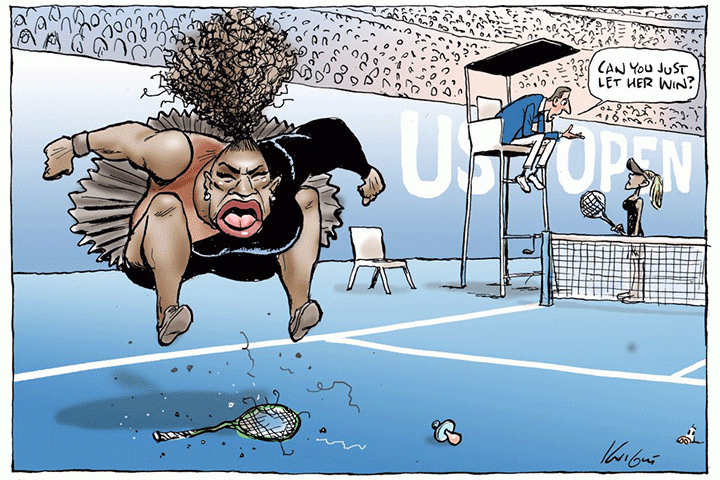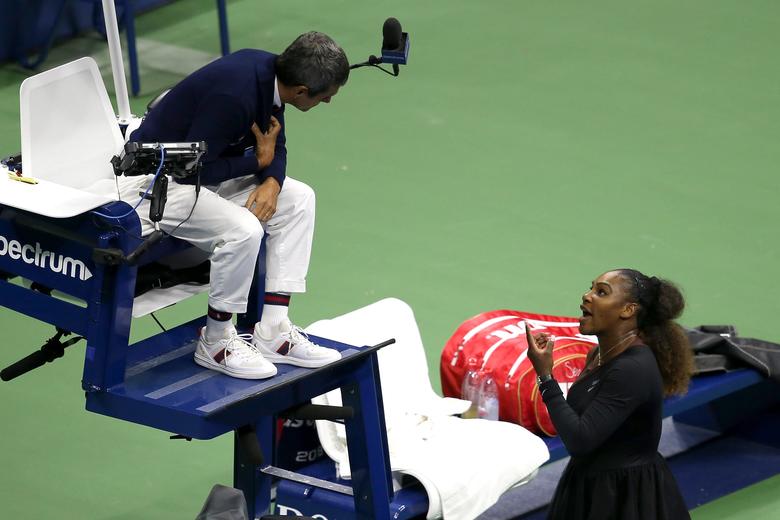A few days back, Serena Williams faced a lot heat for getting into a major beef with the umpire in the U.S Open Finals, which was a consequence of his decision to penalize her for certain violations. I would not go into the particularities of the incident, but majorly focus on what this incident really signifies.
Serena’s career has been one hell of a ride given all that she has suffered over the years, because of the different social identities she carries with her, regardless of her being an amazing athlete and an inspiration beyond all that. Be it extensive drug testing, getting trolled and bashed for not looking like a ‘woman’ and now, for ‘overreacting’ and being ‘unruly’ or just the brazen sexism she’s been subjected to.
This is not to say that people must be allowed to behave any way they like, especially at places where they must maintain discipline – but it’s only fair that we treat humans as just humans, and not infallible entities who must ‘control’ their emotions at all costs. But Serena’s situation is very relatable in terms of how women, in general, are dictated to behave, and also get ‘punished’ for violating these behavioural norms which sustain a society that gets nurtured by them.
Given that most of us are socialized into behaving in ways that conform to our specific gender identities, it’s considered only ‘normal’ to not blow situations ‘out of proportion’ when you’re a woman. Several male tennis players like James Blake and Andy Roddick came out in Serena’s support, stating that they behaved worse in the court and did not get penalized like this.
Serena’s situation is very relatable in terms of how women, in general, are dictated to behave, and also get ‘punished’ for violating these behavioural norms.
Not only was Serena penalized by Carlos Ramos, the umpire in hot water, with three code violations, she was also slapped with a fine of $17,000 for these violations. This is not to say that women must be allowed to get away with what men can get away with, rather, men should be held to the same standards that women are forced to. Ramos’s stance was overtly sexist in as much as Serena got literally ‘punished’ for arguing with him.
Male tennis players have often talked about as to how they were usually given warnings in such cases and the issue never escalated like this. Perhaps it is difficult to imagine a woman breaking her tennis racket in rage, as this behaviour is normalized for men. Consider Andre Agassi, another male tennis player, who broke his tennis racket in the court during French Open years ago, but did not face the same consequences as Serena did. And then there was Djokovic, who got into an argument with the same Carlos Ramos at the French Open, verbally abusing and accusing him of worse things, but this did not result into docked point or game for Djokovic. Not only this, pro tennis players like Andy Murray, Nick Kyrgios and Rafael Nadal have gotten into fights with the same Ramos, and gotten away without any major penalty for the same.
Also Read: (On) Female Anger: The Gendered Diagnosis Of Emotions
However, there’s much more than just sexism in this issue. More than being a woman, Serena’s identity of a Black woman is the most pronounced of all her identities. The fact that her appearance doesn’t match white Eurocentric standards of beauty has been the cause of much racist vitriol (the Williams sisters Serena and Venus have been called the “Williams brothers” in the past for looking ‘too muscular’!). Serena’s identity as a Black woman is responsible for a lot what she has faced over the years. This incident is no exception.
Women, and women of colour specifically are expected to temper their emotions, to ‘remember their place’ in the society and not yield to emotional outbursts. Take White female tennis players like Coco Vandeweghe and Victoria Azarenka who have said worse things on the court to umpires and gotten away with it without severe penalties. As apparent from the several examples of male tennis players getting away with almost everything they did in the court, it’s safe to assume that it’s never about the rules alone, but has a lot to do with this gender essentialist understanding that proscribes women from “behaving like men”.
Women, and women of colour specifically are expected to temper their emotions, to ‘remember their place’ in the society and not yield to emotional outbursts.
This ‘tone policing’ is a problem for women all over the world who are accused of being hysterical, irrespective of their privileges or destitution. While a male athlete who uses profanity and breaks stuff in the heat of the moment is eulogized for his valour and passion, Serena Williams is maligned for breaking the rules and having an “outburst”, or for being histrionic. Several media portals described her behaviour as ‘self-pitying melodrama’, while others thought she acted like a sore loser, and brought in gender and race to ‘shroud her embarrassment’ for losing the game to Naomi Osaka. Take a look at the Australian media’s role (cartoonist Mark Knight at The Herald Sun) in portraying Serena, in a cartoon, as a demonised black woman for being a ‘brat’, right after this incident came into light.

Image Source: The Herald Sun
As far as this issue is concerned, the video of Williams’s “meltdown” is so problematically portrayed that it’s difficult to really point out as to what constituted as ‘verbal abuse’ in the matter. Initially she was seen calmly demanding an apology from Ramos for sullying her reputation as a ‘cheater’, and it was only after subsequent penalties where Ramos continuously escalated the situation instead of diffusing it, that she lost her cool and called him a ‘liar’ and a ‘thief’.
Regardless of veracity of this alleged verbal abuse, the issue is not really about who’s the bad guy here. Carlos cannot and must not be absolved of his duty to explain his differential stance when it comes to penalizing different sexes. As mentioned in the beginning of the piece, there’s probably never an appropriate justification of violating rules and being undisciplined, but does this really call for what looks like a ridiculously sexist and a racist move to institutionalize the “appropriate behaviour” that women, or specifically women of colour, mustn’t deviate from?
Carlos cannot and must not be absolved of his duty to explain his differential stance when it comes to penalizing different sexes.
There is, perhaps, a risk of being accused of cherry-picking, for using anecdotal evidence to say that umpires in this sport have been consistently sexist. Nevertheless, it is plainly absurd to downplay the role of racial and sexist undertones of this matter. It is important to understand that anecdotal experiences do not refute empirical evidence of systemic discrimination of any kind. If it hasn’t happened to you, does not mean it’s not true. This is a common problem the oppressed and the marginalized face, where their issues and experiences are cloaked by the majoritarian and privileged understanding of them.
For instance, several MRA groups, and other groups who deny their privilege, often accuse the oppressed and the marginalized for ‘reverse discrimination’ and conveniently ignore the realities to have a better understanding of whose upliftment must be prioritized. Making declarative statements about complex issues that aren’t really your issues downplay the struggle of people who continue to face discrimination due to these identities that the society has created for them. As much as privilege is often obscured to those who have it, discrimination is as manifest for those who suffer because of it.
Also Read: Privilege 101: Your Handy Primer To Oppression And Privilege
Featured Image Credit: Alex Pantling/Getty Images via Slate.com
About the author(s)
Mehak Bajpai is a lawyer in early twenties. She’s pursuing her career in legal academia at National Law University Delhi. She specializes in criminal law, constitutional law and strongly feels about gender issues.




